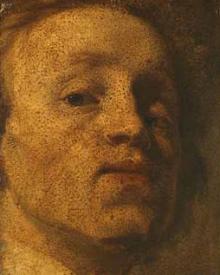translation from original Dutch, Fons Heijnsbroek, 2018
version in original Dutch / citaat van J. H. Weissenbruch, in het Nederlands: Ik heb verleden jaar een beetje te veel van mijn krachten gevergd, ik kan dat niet volhouden, het was mij niet mogelijk, ik moest weder terug, ik heb niets zitten maken als steenen [over zijn schilderijen?].. .Zij hebben van mij mooie schilderijen willen zien en ik heb ze nog niet kunnen maken, de eene illusie verdwijnt voor de andere, ik heb de koude werkelijkheid gemaakt, en ik heb de Waarheid gemaakt. Is er een waarheid, de koude werkelijkheid is ook een waarheid. Wat daartusschen ligt was baroque conventie. Ik heb alles in de kachel gestopt.. ..ik zit er mijn tijd op te verknoeien; wat materieel is, is voor mij geen kunst. Ik heb die er niet uit kunnen brengen.
in a letter to E. Goossens van Eijndhoven, c. 1886, published in Onze Kunst, 1918, p. 136; as cited in 'Matthijs Maris' in Palet serie; een reeks monografieën over Hollandsche en Vlaamsche schilders https://archive.org/details/paletserieeenree4amstuoft, dr. H. E. v. Gelder; H. J. W. Becht, Amsterdam, pp. 13-14
Matthijs was that year painting his famous work 'The Bride, or Novice taking the Veil / De Kerkbruid' https://en.wikiquote.org/wiki/Matthijs_Maris#/media/File:Matthijs_Maris_The_Bride,_or_Novice_taking_the_Veil,_c_1887.jpg
Famous Matthijs Maris Quotes
version in original Dutch / citaat van J. H. Weissenbruch, in het Nederlands: Thijs, Thijs, je bent bij een volk gekomen [in Parijs], toen het hun goed ging, nou mot je ze ook helpen nou ze in nood zitten.
Quote of Matthijs in his letter to Fidolin Becker, from Paris 1870-71; as cited by Haverkorn v. R. in Onze Kunst, 1918 - 2. p. 122 and beyond
Thijs registered with the National Guard, to defend the Paris' people against the Germans. Later Thijs told however he never loaded his rifle, he was only guarding. Later he got a lot of sympathy for pacifism.
in a letter to David Croal Thomson (1907), as cited in: The Brothers Maris (James – Matthew – William), ed. Charles Holme; text: D.C. Thomson https://ia800204.us.archive.org/1/items/cu31924016812756/cu31924016812756.pdf; publishers, Offices of 'The Studio', London - Paris, 1907, p. BMxv
empty, 'helpless'.
in a letter to David Croal Thomson (1907), as cited in: The Brothers Maris (James – Matthew – William), ed. Charles Holme; text: D.C. Thomson https://ia800204.us.archive.org/1/items/cu31924016812756/cu31924016812756.pdf; publishers, Offices of 'The Studio', London - Paris, 1907, p. BMxxxviii
in a letter to David Croal Thomson (1907), as cited in: The Brothers Maris (James – Matthew – William), ed. Charles Holme; text: D.C. Thomson https://ia800204.us.archive.org/1/items/cu31924016812756/cu31924016812756.pdf; publishers, Offices of 'The Studio', London - Paris, 1907, p. BMxvii
Quote of Matthijs Maris, as cited by David Croal Thomson (1907), in: The Brothers Maris (James – Matthew – William), ed. Charles Holme; text: D.C. Thomson https://ia800204.us.archive.org/1/items/cu31924016812756/cu31924016812756.pdf; publishers, Offices of 'The Studio', London - Paris, 1907, p. BMxiii
In 1870 Matthijs Maris was enrolled in the Municipal Guard of Paris, but avoided there any kind of fight.
version in original Dutch / citaat van Matthijs Maris, in het Nederlands: mijn was een geboren schilder which means, hij had er plezier in.
Quote of Matthijs c. 1890; in Jacob Maris (1837-1899), M. van Heteren and others; as cited in 'Ik denk in mijn materie', in exhibition catalog of Teylers Museum / Museum Jan Cunen), Zwolle 2003, p. 29
his remark shortly after Jacob's death, from London where Matthijs lived for many years
Quote of Matthijs Maris, in his letter to David Croal Thomson (Oct. 1890), as cited in: The Brothers Maris (James – Matthew – William), ed. Charles Holme; text: D.C. Thomson https://ia800204.us.archive.org/1/items/cu31924016812756/cu31924016812756.pdf; publishers, Offices of 'The Studio', London - Paris, 1907, p. BMxv p. BMxviii
“My brother Jaap was born as a painter, which means he really enjoyed it.”
translation from original Dutch, Fons Heijnsbroek, 2018
version in original Dutch / citaat van Matthijs Maris, in het Nederlands: mijn broer Jaap was een geboren schilder which means, hij had er plezier in.
Quote of Matthijs c. 1890; in Jacob Maris (1837-1899), M. van Heteren and others; as cited in 'Ik denk in mijn materie', in exhibition catalog of Teylers Museum / Museum Jan Cunen), Zwolle 2003, p. 29
his remark shortly after Jacob's death, from London where Matthijs lived for many years
